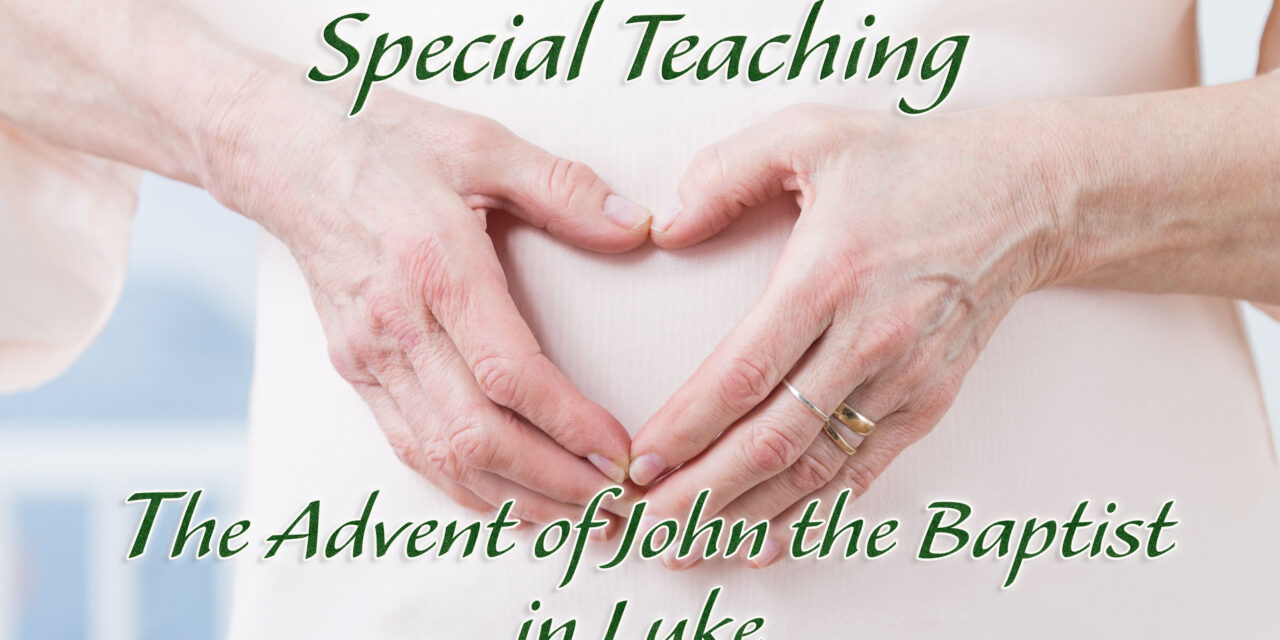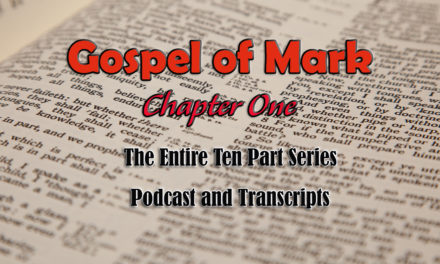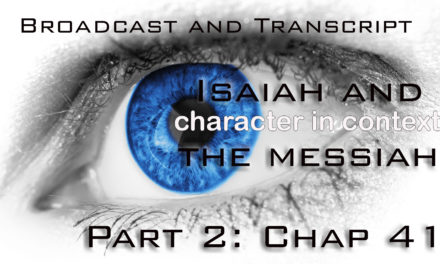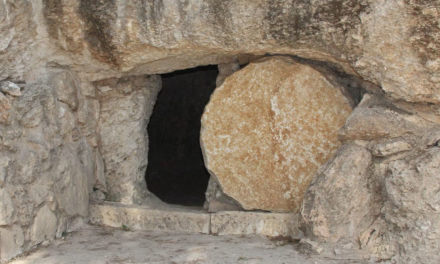Sometimes we forget that the Gospels contain three, and not just two, advent accounts because the arrival of “Elijah before the great and dreadful day of the Lord” was anticipated almost as much as the coming of the Messiah Himself! And it’s an exciting story full of angelic visitations, a barren older mamma, a prophetic unborn child, and a dad who is quite literally speechless!
(My affiliate links for Amazon products are included in the post. As an Amazon Associate, I earn from qualifying purchases.)
If you can’t see the podcast player, click here.
As I am writing this, it is the first day of Hannukah 2022 and as such it is the day that I personally celebrate the arrival of the angel Gabriel to Mary to inform her of the miraculous nature of what is about to happen to her. And as much as I would love to talk about that today, as we are in Luke’s advent chapters, the advent of John the Baptist comes first and is extremely important to understanding the context of the promises to Mary. Advent, and I am not talking about the liturgical season, is a word that means “the coming of a great person, thing, or event.” And the coming of Elijah, the forerunner, the one who would make straight the way of the Lord—and we talked about this a lot when we studied Mark—was where it all begins, related to us by Luke according to the ancient genre of narrative (which means storytelling) and specifically historical narrative. Very different from other Biblical accounts, however, is Luke inviting us into the thoughts of people and most especially Mary the mother of Yeshua/Jesus. So, as much as I wished I had done my studying earlier and was telling her story today, John comes first. I am going to take some artistic license and make some assumptions of things that are not spelled out in Scripture, but I really want this to be impactful so that we can understand the larger story. Plus, I want to keep it in narrative, or story, form as much as possible as that is how we received it. And even more importantly, how the original audience would have received it. But maybe a bit funnier in some spots.
Hi, I am Tyler Dawn Rosenquist and welcome to Character in Context, where I teach the historical and ancient sociological context of Scripture with an eye to developing the character of the Messiah. If you prefer written material, I have seven years’ worth of blog at theancientbridge.com as well as my six books available on amazon—including a four-volume curriculum series dedicated to teaching Scriptural context in a way that even kids can understand it, called Context for Kids (affiliate link) and I have two video channels on YouTube with free Bible teachings for both adults and kids. You can find the link for those on my website. Past broadcasts of this program can be found at characterincontext.podbean.com and transcripts can be had for most broadcasts at theancientbridge.com. If you have kids, I also have a weekly broadcast where I teach them Bible context in a way that shows them why they can trust God and how He wants to have a relationship with them through the Messiah.
All Scripture this week comes courtesy of the CSB, the Christian Standard Bible, but you can follow along with whatever Bible you want. For those of you who got used to the ESV when I was teaching Isaiah and Mark, this is a good chance to get acquainted with another really terrific translation.
During the last years of King Herod the Great, who ruled all of the Land of Israel as a vassal king to the mighty Roman Empire and was known as much for his terrible brutality as his magnificent building projects, there was a priest from the line of Abijah named Zechariah. Now, the House of Aaron had been divided into twenty-four divisions by King David so that all of the priests could share in the work of the Temple. By families, they would serve two weeks a year, but they would all come to serve during the festivals but it was determined by lot which priests would be in attendance on any one day as there were far too many sons of Aaron in the Land of Israel in those days to fit them all in the Court of the Priests at the same time. And as it was the eighth week of the cycle, he and his male relatives and even extended relatives had been called to serve in the Temple at Jerusalem, one of the ancient wonders of the world, from Sabbath to Sabbath. He rose early from his sleep in the Beit HaMoked, the huge building at the Northwest corner of the Azerah which served as, among other things, the dormitory for the priests on duty. He descended the spiral rock steps down below where he could relieve himself and immerse in a Mikveh before the younger men woke up and beat him to it. Ritually cleansed, he emerged and readied himself for the duties of the day, hoping that after all these years he would finally be chosen by God to perform the coveted, once in a lifetime opportunity to perform the incense ceremony in the Holy place, standing before the Parokhet, the beautiful veil that separated the Holy Place from the Holy of Holies. Zechariah was running out of years of eligibility and his time as a priest was coming to an end. Soon, he wouldn’t be strong enough to perform the laborious work of the Temple. But each day he served was another opportunity to hope that, even though he and his wife had no children, that this dream at least, would be realized.
The priests gathered in a large circle at the southeast corner of the Court and were instructed to each hold up one or two fingers. The chief priest in charge called out a number and began counting fingers, and whoever’s upheld finger or fingers was at the end of the count would be chosen for this job or that job—removing ashes from the altar, replacing the wood, tending to the lamps on the Menorah, and finally—the one chosen for the most coveted duty of all, the lot reserved onto for those who had never performed the ceremony before. Zechariah held his breath as the priest announced the number and began counting fingers and his heart raced as he realized that if it wasn’t him, it would be someone close by him. When the chief priest placed his finger on Zechariah’s upraised finger and smiled, there was great gladness from all the rest of them—Zechariah being the oldest in the circle and greatly respected among the people. Five had been chosen to perform the duties in the Holy Place—and they would perform these duties quietly and reverently. The bread of the presence was only changed out on the Sabbaths but the work of the Menorah and the Incense services daily was quite complex.
Coals were brought in from the outer altar and arranged carefully on what was called the Golden Altar, and it was Zechariah’s job to place the special incense upon it as an intercession for the people of God. One by one, the other priests finished their jobs and went out to wait upon the steps leading up to the Heikal, and they waited for Zechariah, and waited, but he didn’t emerge. The elders from the communities around Israel were gathered for the Amidah prayers. Zechariah’s absence would have been more and more alarming as time went on, but no one dared go in to get him. So, what was happening? After all, everyone agreed that despite Elizabeth’s failure to conceive, Zechariah was above reproach and blameless—and very deserving of this honor at long last. Had they been wrong? Had Yahweh struck him dead over some secret sin?
As the last of his four companions left the sanctuary, Zechariah was shocked to see a strange man, dressed in white, standing to the right-hand side of the Altar of Incense. Struck with terror and fearful of the overwhelming presence of this man who was obviously far more than just a mere man, unable to turn his back on the Holy of Holies to run and yet frozen in place, the figure’s words confirmed what he hardly dared to believe, “Do not be afraid, Zechariah, because your prayer has been heard. Your wife Elizabeth will bear you a son, and you will name him John. There will be joy and delight for you, and many will rejoice at his birth. For he will be great in the sight of the Lord and will never drink wine or beer. He will be filled with the Holy Spirit while still in his mother’s womb. He will turn many of the children of Israel to the Lord their God. And he will go before him in the spirit and power of Elijah, to turn the hearts of fathers to their children, and the disobedient to the understanding of the righteous, to make ready for the Lord a prepared people.”
Zechariah, being a righteous and blameless man who knew the Scriptures from his youth, realized that he was standing in the presence of an Angel of the Lord. “Do not be afraid,” the angel had said and for the first time in his life, he understood exactly why the angelic encounters with the great men and women of the past had been the cause of such desperate need for this reassurance. Indeed, nothing could have prepared Zechariah for the overwhelming awe that he felt in the presence of the angel and how easily it would be to fall down in worship before him. A thousand thoughts filled his mind as the words shook him to the core and became part of his deepest awareness. His prayers had been heard—God was not deaf to his crying out after all. After all these years, when he had reached the age of being required to step down from his priestly duties in the Temple, he was being promised a son and not just any son but a son through his aged wife Elizabeth, who was not only barren but long past the time of women to become pregnant at all. Elizabeth, a mother! Himself, a father! And a son to be named Yochannan—meaning “God is gracious” and a name unknown to his own family, and so a name they would have never chosen for a child. But what could be a better name than this pronouncement of the graciousness of God in giving an elderly couple a son! Like Abraham and Sarah, who were also given the name of their miraculous son Isaac, by the Angel of the Lord. And of course, nothing would give him more joy but why would others rejoice? And many, at that! Many—a word laden with so much meaning by the prophet Isaiah who spoke of the Messiah and the many who would be saved and not only from Israel but also the Nations would come to worship the Lord! A son of his at all, but a great son? Great in the eyes of God Himself? And he mustn’t drink alcohol—was his miracle son to be a Nazirite for life as Samson was—another miracle child born to a barren woman! What is happening?
Zechariah’s mind could not stop racing as he considered the implications of this strange encounter and even stranger message—who was he but an elderly priest and who was his wife that they should have this honor? And this child, John, would be filled with the Holy Spirit from the womb? Certainly, the Spirit fell upon Kings and Prophets and the artisans who carried out the work of the Tabernacle but from the womb? Nothing like this had ever been heard of in Israel! Why would any child have such a calling as to be filled with the Spirit which guided the prophets before he was even born—is this why he is being compared to Elijah? Didn’t Malachi prophesy that Elijah would come again, and that the Lord whom they sought would come to His Temple—in judgment against the wicked of His people and specifically against the priesthood? Was the Day of the Lord suddenly to come upon them? And would this child be the promised forerunner who would prepare His way and make His paths straight? What will he do to cause the “many” that Isaiah spoke of to turn back toward their God after so many exhausting years of occupation, war and oppression? What message would John bring? What hopes will he restore to his people? And the power of Elijah—will he be a miracle worker? Or a bold preacher? Or maybe both?
The elders at the city gate were always grumbling about how the children are straying from the right path and needed to return to the faith of the fathers but this angel was telling him that it is the heart of the fathers that needed to return to their children? Zechariah, like every other person in the ancient world, had barely known his father until he became a man—he was expected to honor his father but the idea of fathers being drawn to their children was a foreign idea. And with the angel’s very next statement, the disobedient would be turned to the understanding of the righteous—why was the angel equating the fathers with the disobedient and their children with the righteous? What was about to happen with this upcoming generation that would put his generation to shame? Zechariah’s head was spinning trying to process the information and it just didn’t seem possible—was he hallucinating? It seemed as though he had lived a lifetime over the past thirty seconds, and he stammered, “How can I know this? For I am an old man, and my wife is well along in years.”
The Angel looked at Zechariah and we can only guess at what he was thinking but perhaps something like, “Dude, I just materialized beside the Altar of Golden Incense in the Holy Place, are you serious??? Do you think I came here on a whim just to get your hopes up? I mean, that’s the question you ask because the logistics are more unbelievable than everything else I just told you?” But, he answered, “I am Gabriel, who stands in the presence of God, and I was sent to speak to you and tell you this good news. Now listen. You will become silent and unable to speak until the day these things take place, because you did not believe my words, which will be fulfilled in their proper time.” In other words, “Oh my gosh dude, are you kidding me? I am not just any run of the mill messenger boy, I am Gabriel—yeah, that Gabriel—and for reasons that aren’t entirely clear to me at the moment, God sent me to tell you this, you know, super fantastic news that really should have you leaping for joy and hollering even though you are in the Holy Place and I am really not used to being doubted, okay? So listen up and listen tight—not one more word out of you until all of this comes to pass. You won’t be able to say anything else or hear anything else. I just can’t even believe you right now.” Or something like that. It’s the TDR version of the Bible. Gabriel is clearly irritated. Yes, Zechariah is righteous and blameless but I think he is also related to Peter, James and John because he sure put his foot in it.
And the people and his fellow priests have been out there all this time, waiting, and the silence and anxiety must have been palpable. People shuffling from foot to foot, agitated and confused and really wondering what was going to happen and what should happen when all of a sudden, Zechariah finally backs out though the outer curtain and past the massive, opened doors. When he finally turned to look at them all, he must have looked absolutely alarmed but he couldn’t even tell them why so they knew he must have had a vision while he was inside—which was amazing because it was general knowledge that such things just didn’t happen anymore as they did in the days of the kings and prophets. Zechariah completed the week of his service, as there were no disqualifications for either being deaf nor mute, and then he returned home. Was he even able to tell his wife what had happened? We know that he could read and write but it was very likely that she couldn’t as she would have no need to do so and girls were rarely educated in anything that wasn’t absolutely necessary. All we know is that whatever happened, Zechariah was the talk of the town and a legitimate mystery.
As for Elizabeth, after learning that she was pregnant, she secluded herself for the next five months. People wonder why and so this is a time for seriousness here coming from me as a barren woman who has been pregnant a lot. We know that she wasn’t simply barren but had never been able to conceive before either. And that’s a big difference—she has never been pregnant before and at her age simply being out in public pregnant would have exposed her not to awe and wonderment but perhaps ridicule and a compounding of her shame if she was to miscarry. And you need to know how heavily that possibility weighs upon the mind of every woman with fertility issues—we don’t just get pregnant and assume everything always works out because we, more than anyone else, know better even when we are deliriously happy. In the sixth month, Elizabeth emerged and said, “The Lord has done this for me. He has looked with favor in these days to take away my disgrace among the people.” What an announcement, showing up outside for the first time in five months, six months pregnant and unmistakably so. There would have been whispers, murmuring, joyous laughter, disbelief, and a great many comparisons to Sarah. After all these years, it was finally Elizabeth’s turn in the spotlight and she was finally seen as both a true woman and a true wife because, sadly, a woman was defined by the community by her ability or inability to bear an heir for her husband. Her pronouncement wasn’t anything that everyone else wouldn’t have thought and understood.
A short time later, or perhaps even before the announcement, a young teenager named Mary traveled from Nazareth to the hill country of Judea in order to investigate her own angelic claim that her relative Elizabeth was miraculously pregnant. Coming to the door and speaking a respectful greeting, as was proper for a younger person in the presence of an elder of higher social status, and Elizabeth was shocked by the sudden violent action of the baby within her womb. As she turned to look at who was addressing her, she saw her young relative Mary and Elizabeth was immediately filled with the Holy Spirit and she cried out in prophetic utterance, “Blessed are you among women, and your child will be blessed! How could this happen to me, that the mother of my Lord should come to me? For you see, when the sound of your greeting reached my ears, the baby leaped for joy inside me. Blessed is she who has believed that the Lord would fulfill what he has spoken to her!”
Mary, as well, broke out in joyful song and praise extolling the great works of God in her life despite her lowly status and of His faithfulness in remembering His covenant people with salvation at long last. As Elizabeth was very far along in her pregnancy and as Zechariah wasn’t much for conversation lately, the presence of Mary must have been an incredible blessing and, as she wasn’t showing her own pregnancy yet, she was able to safely live among their community without fear of scandal or being discovered by her own family, fiancé, and friends. We can hardly even imagine the long conversations shared between them and I imagine that Mary was very happy to have someone to share her experiences with. Although there is nothing said about Mary after the birth of John, it would not be unlikely that she would stay to help her relative for a short while after the birth—at which time she would have returned just beginning to show the growing evidence of her own miracle.
When Elizabeth came to full term and gave birth to a son, the entire village and all of her relatives would have been abuzz with awe and excitement. An old barren woman gave birth to a son, why, it was positively Biblical! Nothing of the sort had happened in so long that even their great-great-great grandparents would have been in disbelief. Speculation about the child would have reached a fever pitch by this point, what with the geriatric pregnancy, the mute-deafness of the father since his mystery encounter within the Holy Place, and with the child being a boy. Could he be the Messiah? Many in that time period believed from looking at the Scriptures that there would be a priestly Messiah in addition to a Davidic Messiah. John would certainly qualify as a priestly Messiah and the signs certainly suggested that it was more than possible. Perhaps, at the bris, the circumcision ceremony where the boy would be named, there would be another sign and no one wanted to miss it.
The priest performing the ceremony, with the father still unable to speak, said that he would be named Zechariah, but Elizabeth stepped in to stop him. “No. He will be called John,” she corrected him, much to the confusion of the gathered crowd. They muttered among themselves in shock because there were no children named Yochannan in their family and the custom was to preserve family names in order to honor relatives. Certainly, she must be out of her mind and so they informed her that there were no relatives of that name, because obviously she would have no idea, right? And they were obviously miffed about it because they went to Zechariah to try to override her and he wrote on a tablet confirming that she was quite correct (how did she know?) in the naming. And suddenly he was filled with the Spirit and began to sing and prophesy (because this chapter is rather a lot like a musical):
“Blessed is the Lord, the God of Israel, because he has visited and provided redemption for his people. He has raised up a horn of salvation for us in the house of his servant David, just as he spoke by the mouth of his holy prophets in ancient times; salvation from our enemies and from the hand of those who hate us. He has dealt mercifully with our ancestors and remembered his holy covenant—the oath that he swore to our father Abraham, to grant that we, having been rescued from the hand of our enemies, would serve him without fear in holiness and righteousness in his presence all our days. And you, child, will be called a prophet of the Most High, for you will go before the Lord to prepare his ways, to give his people knowledge of salvation through the forgiveness of their sins. Because of our God’s merciful compassion, the dawn from on high will visit us to shine on those who live in darkness and the shadow of death, to guide our feet into the way of peace.”
And the people wondered even more who and what this child would grow up to be.






















this filled my heart, which then leaked outta my eyes! Cheers.